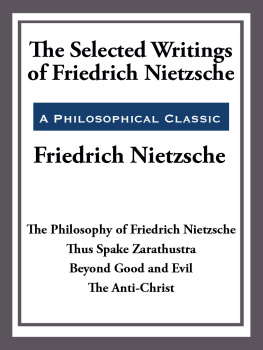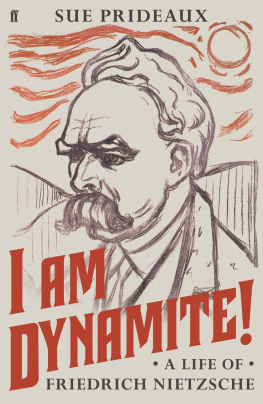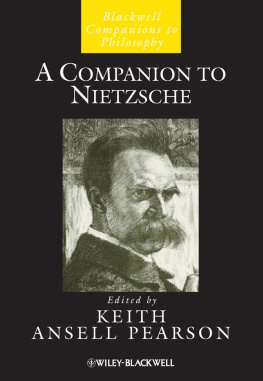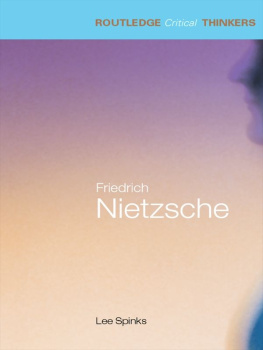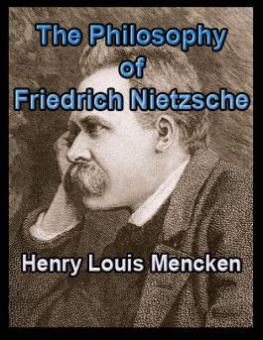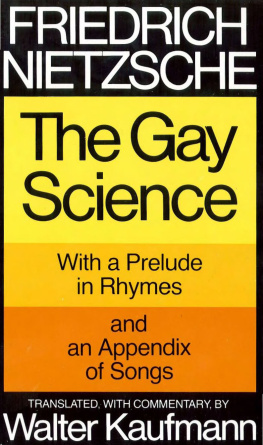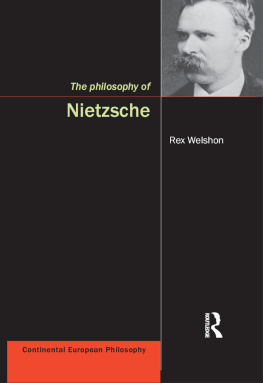Contributors
Editors
M. Saverio Clemente is a husband and father of three. He is a doctoral candidate at Boston College specializing in philosophy of religion and contemporary Continental thought. He is the author of Out of the Storm: A Novella (Resource, 2016 ) and the coeditor of The Art of Anatheism (Rowman and Littlefield, 2017 ) and Richard Kearneys Anatheistic Wager (Indiana University Press, 2018 ).
Bryan J. Cocchiara is currently an adjunct professor of philosophy at Brookdale Community College. His areas of interest include Nietzsche, Schopenhauer, Kierkegaard, and Bernard Lonergan, SJ. He received his MA from Boston College in 2014 , where he was a research fellow at the Lonergan Institute.
Contributors
Teresa Fenichel is a visiting assistant professor of philosophy at the College of the Holy Cross. She received her PhD in philosophy at Boston College in 2015 . Routledge will be publishing her first book, Uncanny Belonging: Schelling, Freud and the Vertigo of Freedom , in 2018 .
Melissa Fitzpatrick is a PhD candidate in philosophy at Boston College. Her research interests include contemporary ethics, Continental philosophy (especially Levinas), the history of ethics, and the philosophy of pedagogy and communication.
William J. Hendel practices private equity and mergers and acquisitions law in Boston, Massachusetts.
John Panteleimon Manoussakis is associate professor of philosophy at the College of the Holy Cross, USA, and honorary fellow of the Australian Catholic University, Australia. He is the author of The Ethics of Time (Bloomsbury, 2017 ), For the Unity of All (Cascade, 2015 ), and God after Metaphysics (Indiana University Press, 2007 ).
Stephen Mendelsohn is currently a teaching fellow in philosophy at Boston College. His chief philosophical interests are in ethics and epistemology, particularly in the Platonic and contemporary Continental schools of thought. He is a native of the central Massachusetts area. He received his BA from Providence College and his MA in philosophy from Boston College.
Thomas P. Miles is a visiting assistant professor in the philosophy department of Assumption College. He is a Fulbright scholar who holds degrees in philosophy from Yale University, Cambridge University, and the University of Texas at Austin. He has published numerous articles on Nietzsche, as well as Kierkegaard, Wittgenstein, Hume, and Dante. He is the author of Kierkegaard and Nietzsche on the Best Way of Life (Palgrave-Macmillan, 2013 ).
Vicente Muoz-Reja is PhD candidate in philosophy at Boston College.
Scott M. Reznick is a doctoral candidate in English at Boston College and a graduate fellow at the Clough Center for the Study of Constitutional Democracy. His scholarly work explores the intersections between literature, politics, and philosophy. His essays and reviews have appeared (or are forthcoming) in American Political Thought , Early American Literature , and Religion and the Arts .
Hayyim Rothman teaches at Boston College, where he earned his doctorate in philosophy focusing on the work of Benedict Spinoza. Hayyim is an ordained rabbi and also holds advanced degrees in Jewish thought and in education. Beyond early modern philosophy, his current interests include Jewish political theology, philosophical anarchism, and the aesthetics of humor.
Hors-Texte
How to Avoid Reading:On Nietzsches Apophatic Philosophy
John Panteleimon Manoussakis
H ow to read Nietzsche? Should we even read Nietzsche? That is, are Nietzsches works to be read or, as their idiosyncratic character might suggest, are they works of a different literary genre than that of discursive and expository philosophy, and perhaps even of a different art altogether than literature? Is it possible that we have misread Nietzsche all along by mistaking the identity of his philosophy? Is it possible perhaps that we have misread Nietzsche simply because we have read Nietzsche?
These questions prompt an inquiry into what it means to read and how one reads. From the outset, then, a phenomenology of reading will be required before we can raise the questions that occupy this volumequestions that seek to organize, evaluate, decide among Nietzsches many readings and misreadings. Unfortunately, the task of undertaking such a phenomenology of reading goes well beyond the limitations of the present foreword.
How, then, are we to read Nietzsche (and, by extension, all philosophy) if we are to avoid misreading him?
To the extent that Nietzsches polyphonic style both welcomes and resists misreadings , that is, first and foremost philosophys own attempts to inscribe Nietzsches words (for, to speak of Nietzsches thought would be to commit and repeat such an attempt) within some ideology or, to organize them under some ideological concept, even into a system, all misreadings of Nietzschepast, present, and futureare idolatrous. Once more, God is dead. But in this case, it is Nietzsches crucified Dionysus that dies when Nietzsche is taught and by being taught in our academic amphitheaters. For within the amphitheater, that is to say, within the limits of reason alone, both Christ and Dionysusif Christ follows Dionysus,/Phallic and ambrosial (to recall Ezra Pounds Hugh Selwyn Mauberley )have to die if philosophy is to livefor so too does philosophy live and thrive... by the death of God.
Fauns flesh is not to us,
Nor the saints vision.
We have the press for wafer;
Franchise for circumcision.
This, in fact, was the very accusation brought against philosophy (and philosophers) by Nietzsche who, in his work appropriately named Twilight of the Idols , writes:
All that philosophers have handled for thousands of years have been concept-mummies [ Begriffs-Mumien ]; nothing real escaped their grasp alive. When these honorable idolaters of concepts [ diese Herren Begriffs-Gtzendiener ] worship something, they kill it and stuff it; they threaten the life of everything they worship (TI, Reason in Philosophy, ).
It is important to pay attention to Nietzsches language. He speaks of a worship to which philosophers have dedicated themselves for thousands of years; but this is not the worship of the living God, the God of Abraham, of Isaac, and of Jacob, to use Pascals terms, but, as one might indeed expect, the God of the philosophers. Nietzsche is more accurate in his description: it is an idol , that is, a dead or counterfeit god.
But how could a god die, as the madman of Nietzsches Gay Science in so powerful a way declares (GS, , )? Religion, pagan and Abrahamic alike, has taught us that if man were to see god, man would die. You cannot see my face, for no one may see me and live, Yahweh says to Moses (Exodus :). In philosophy this principle becomes reversed: when man sees god, god dies. And he dies by means of this very seeing, by means, in other words, of what we know in Greek as the idea , and in German as Begriff . It is, at once, the crime and the means of that crime that Nietzsche identified by calling the philosopher an idolater of concepts. Far from being a criticism of a religion not credible any more, as it is often assumed, Nietzsches proclamation of the death of God is a powerful condemnation of philosophy and the risk of philosophys aspirations to name (and, by means of naming, to understand, to know ) the unnamable, unknowable God.
Once again we ask: How are we to avoid misreading Nietzsche if even reading amounts to a misreading? How to avoid reading? The root of the problem lies with the question, even before one attempts to give an answer, for such a question assumes that Nietzsche is to be read. The problem is an old one. How can we speak of God by avoiding the inevitable conceptual idolatry about which the madman has issued that stern warning? In his famous essay How to Avoid Speaking, Jacques Derridas sustained reading of Dionysian apophaticism reaches the same aporia:


